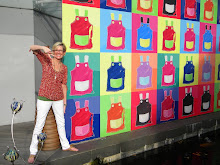 Last night at dinner at the American Club, there were two men sitting at a table behind Charlie and me, one of whom had a vocabulary comprised mostly of the f-bomb. And he didn’t speak in mild tones. At one point, I was tempted to go to the library, fetch a dictionary, and present it to him. “Sir, there are a variety of adjectives in here. Have a go at learning some new words to define your world.”
Last night at dinner at the American Club, there were two men sitting at a table behind Charlie and me, one of whom had a vocabulary comprised mostly of the f-bomb. And he didn’t speak in mild tones. At one point, I was tempted to go to the library, fetch a dictionary, and present it to him. “Sir, there are a variety of adjectives in here. Have a go at learning some new words to define your world.”Then I started thinking – what if the words we say created a tangible aura around us? What would mine look and smell like? Yikes…maybe I don’t want to know.
Words, written or verbal, are vital to our existence. They are how we build relationships, get work done, create our world. But I know I often use them recklessly and unconsciously.
My friend, L., and I were talking yesterday about the common stereotypes in organizations about various departments – legal, H.R., finance, marketing. I realized how debilitating these preconceptions can be to team spirit – and, even when we think we’re encouraging teamwork, how easily innuendo can undermine unity. An accountant walks into the conference room and someone says “Ah, the bean counters are here.” Or comments are made like “the folks from legal are sure to slow us down.” Or “those marketing guys don’t have a clue about who really does the work around here.” These little digs, often disguised as humor, are like poisonous darts aimed right at the heart of the team.
Another word abuse to watch out for is the use of the term “girl” for almost any female co-worker. Would you call a male co-worker a “boy”? “Who’s that boy in engineering on the first floor?” I don’t think so, unless you are truly employing child labor. So what term is appropriate? I personally like “colleague”. It’s gender-neutral, professional, and respectful. Take it out for a test spin.
In the book of Samuel, the elder Eli mentors the young boy Samuel, instructing him to listen to God when he calls. Samuel does, and we are told that “the Lord was with Samuel as he grew up, and he let none of his words fall to the ground.” (I Samuel 3:19) When Samuel spoke, his words were true, purposeful, and sound.
F-bombs drop loudly, and bring no lasting return to the speaker nor reward to the hearer. But good words – words of integrity, honesty, and generosity – these words soar.
May your words have wings.
A careless word may kindle strife,
A cruel word may wreck a life,
A timely word may lessen stress,
A loving word may heal and bless.
-- Author Unknown

